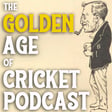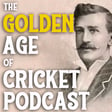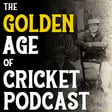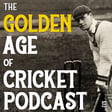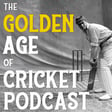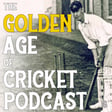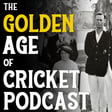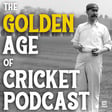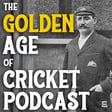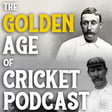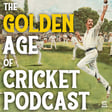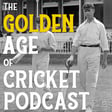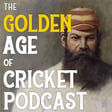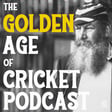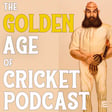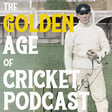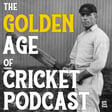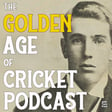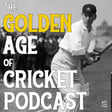Introduction to the Golden Age of Cricket
00:00:07
Speaker
Hello and welcome to this episode of the Golden Age of Cricket podcast, a show to highlight the many fascinating players and matches from the period immediately prior to the outbreak of the First World War.
00:00:19
Speaker
My name is Tom Ford.
Focus on the 1912 Triangular Tournament
00:00:22
Speaker
Today's episode is slightly different to those previous, in that we're not focusing on a single player, rather we're going to look at a particular series, one which took place in the English summer of 1912.
00:00:35
Speaker
Staged just a few weeks after the sinking of the Titanic, for historical reference, the Triangular Tournament of 1912 was the first of its kind, a series in which three cricket nations, England, Australia and South Africa, battled it out across nine test matches.
00:00:53
Speaker
What sounded progressive and lucrative in theory turned out to be a disaster for the administrators, with poor weather, small crowds and absent high-profile players contributing to its doomed status.
00:01:07
Speaker
But more than a century later, how are we to view this tournament and what lessons, if any, were learned? To help us better understand the tournament, I welcome back to the podcast Patrick Faraday, who was a previous guest in a discussion on the subject of Wilfred Rhodes.
Insights from Patrick Faraday
00:01:24
Speaker
In 2010, Patrick wrote a highly praised account of the tournament titled, Before the Lights Went Out, the 1912 Triangular Tournament, and I'm thrilled he's with us today.
00:01:36
Speaker
Patrick, hello and welcome back. Thank you very much, Tom. You've... You've first summarised that series very well. You'd rather stole them a thunder. but Well, yeah let's wrap it up there then. Let's ah let's call it a day. No, there's there's much to discuss and I'm sure many of my listeners know a bit about the 1912 series already.
00:01:57
Speaker
But having read your book, I realized that there's a lot to it. There's a lot of background and obviously ramifications from the tournament. In fact, one of the better things, and there's a number of great things about your book, but one of the better things was how you went into the background of each of these cricketing entities ah back into the 19th century, you know, ah the status of English cricket in the 19th century and the same for Australia and South Africa.
00:02:25
Speaker
How much did you already know going into the research? Or was this a huge learning experience for you? um i knew ah I knew a fair bit about it, to be honest. um But I did have to look at it quite closely. I knew kind of what I was looking for. The idea really was to see how the three countries got to 1912 in terms of test cricket, the development of test cricket.
00:02:55
Speaker
Probably the England-Australia part is better known, starting with Grace and the tours back and forwards and money-making. um The England-South Africa and certainly Australia-South Africa was a little bit more obscure, not very obscure, but... um And it it it seemed logical to work back from 1912 to see how they'd arrived at...
00:03:22
Speaker
what was the first triangular tournament and last. um Well, until until recent times. in ah In a sense, I slightly regret doing that. um It made the book slightly overlong, in my my opinion.
00:03:38
Speaker
um And perhaps should have concentrated ah bit more on the 1912 series itself. But so I suppose a lot of people reading it will be...
00:03:51
Speaker
quite into their cricket, especially at this time of that time. And they'll probably know a lot of that stuff as well. But for the ones who didn't, then, you know, I i think it was a decent summary.
00:04:04
Speaker
um ah It's not an in-depth study of England versus Australia or Australia versus South Africa. but it's a it's it's enough to sort of put you in the mood to how it got to where it was at that time. And also because the the last five or six years, once they'd started trying to organise this damn thing, um it required the ability to look back and and see the points they were arguing over, particularly things like um how the Australian team made money.
Impact of Financial Issues on the Tournament
00:04:40
Speaker
um ah which eventually was, of course, came to came to blows, as as you well know, and um involved the six six of the best Australian players not coming because the money wasn't available.
00:04:57
Speaker
I'm sure we'll go into that a bit later. um Yeah, it was it was it was context, it was background, and yeah i did a fair bit of work on it, but I i did know a a fair bit about it as well. But it was very nice, you know, dotting dotting I's and crossing T's and getting it clear in my own mind as well.
00:05:17
Speaker
Yeah, no, i I very much enjoyed it I think it was necessary, but I was in the camp, perhaps like some of my listeners, where, sure, the English and Australian stuff was more familiar to me, but the South African stuff was illuminating.
00:05:32
Speaker
um And I think it was absolutely necessary before we understood how the tournament came to be, that we understood where South African cricket stood in and the 19th century. So i applaud you for that because I think it was very much needed for the context of the book.
00:05:52
Speaker
Yeah, I mean, Australia and South Africa weren't particularly keen on playing one another, really, to be honest. ah The Australians, because they thought they were better than the South Africans, and they were, um And also because there wasn't any much money to be made from it. So they only met for the first time in, I think it was 1902 when the Australian team were on their way back from the English tour.
00:06:14
Speaker
So they stopped off in South Africa for six weeks or something, played three test matches, beat South Africa, probably not as easily as they thought they would do, but um played on matting wickets as well.
00:06:25
Speaker
um yeah And then they didn't play again for 10 years or something. um And then the 19...
Abe Bailey's Role and British Imperialism
00:06:34
Speaker
10-11 series was the next one first time South Africa played in Australia so yeah there was no there was no huge ah huge appetite for it but it was kind of pushed together in a sense I other think everybody wanted or liked the idea that there were three test nations rather than two which had been the case before it's a shame that South Africa weren't as good as the other two
00:07:01
Speaker
Yeah, and and naturally the Australians wanted to play England in England ah because that's where the money was to be made. and Exactly. And previous three decades, you know they made basically a year's salary or more just from this few-month journey on gate receipts.
00:07:19
Speaker
But we'll we'll talk a bit more about that later. Let's talk about the actual tournament itself and the idea of it. Is it fair to say that it was largely the idea of one man, Abe Bailey?
00:07:33
Speaker
um What can you tell us about Abe and his relationship to cricket? um Sir Abe Bailey, as he later became. he was a um South African businessman, I suppose. It's a bit hard to find out exactly. mean, he was involved in mining, which...
00:07:52
Speaker
pretty much everybody in South Africa who had a lot of money was involved in diamond or gold mining, um, had a lot of property interests and he was, yeah, he was fantastically rich and he did love cricket and he did play. He he played first class cricket. Um, not, ah not hugely successfully, but, but well enough. But, um,
00:08:13
Speaker
what he did do was um throw his money around. um And he threw it at making South Africa um a competitive cricketing nation, um which was pretty tough because basically in South Africa, i suppose you could split the South African population at that time into three different groups.
00:08:36
Speaker
There was the indigenous black population. There was the the English and then there was the Dutch, the Dutch or the Afrikaans.
00:08:47
Speaker
Well, the the black population weren't interested in cricket. um The Dutch population wasn't interested in cricket, which left just the it's just the English. or And that was a very, very small percentage of the population. um But he did his best. He chucked money around. He um employed any number of private secretaries who he got from England who all happened to be first class cricketers, Reggie Schwartz and Frank Mitchell and any number of others.
00:09:18
Speaker
And yeah, he banked he bankrolled um international South African cricket for many years. um He loved it. um I don't think he expected any returns on it.
00:09:29
Speaker
And his dream really was this triangular tournament because it would see South Africa playing on a level field with Australia and England and would somehow make the three of them the, the powers in cricket, um, which South africa Africa were definitely the, the poor, the poor cousin of the, of the three, but he hoped putting the three together.
00:09:54
Speaker
And I think he was given a certain amount of, um, certain amount of confidence or optimism in the sense that in 1905, 1906, South Africa did have a pretty good team.
00:10:07
Speaker
Um, had a lot of good leg break bowlers, had four leg break bowlers, three of whom were very good. Um, And they thumped England on matting wickets in 19... This is 5-6. I think it was 19-5-6.
00:10:23
Speaker
And did very well in England in 1907 on turf wickets, wet turf wickets, um and proved that they were a force to be reckoned with. Yeah.
00:10:37
Speaker
I think that made Bailey think that it was it was possible that the three the the three could compete on ah on a fairly fairly even basis. But unfortunately, the tournament took so long to organise, by the time it eventually came round, that group of South African players were either not as good as they were or had retired altogether.
00:11:00
Speaker
So when it came to it, um this... excellent team of 19, 19 six, um, wasn't really in existence anymore, which is of a shame. Yes, because initially it was the 1909 summer, I believe that everyone was pushing for, but of course that had already been arranged for the Australians to go to England.
00:11:21
Speaker
And the Australians naturally said, no, we don't want to share the gate receipts with anyone. So that pushed it back. And they had some support from ah Stanley Jackson, I believe, who was saying, why are we rushing this idea?
00:11:35
Speaker
Let's get it right. ah So it naturally was pushed back. But as you say, that affected the... perhaps the performance of the South Africans who were coming into their prime just a few years before that. And we'll touch on their form a bit later, just on A. Bailey Patrick. So it sounds like we can credit him with the rise of South African cricket in the late 19th century, early 20th. I mean, he threw his money around, sure, but he is credited with this sort of emergence of
00:12:09
Speaker
South African cricket on the world stage? Yeah, I think money was the obviously the main part of it, but he did have a lot of um connections in England with MCC and he used those connections and he gave them to believe that um he could he could push this thing forward and that if South Africa came to England, they wouldn't necessarily need to draw big crowds or require reimbursement of of any um significant amount because he would he would just fill the shortfall, which he also did for the 1912 series as far as the South African team was concerned.
00:12:51
Speaker
He used his connections, he used his money, ah he used his influence and cricket really was his sort of abiding passion, probably in along with making money um and horse racing. he did he did love He did love his horse racing as well. um So this idea of the tournament is planted in people's minds at the turn of the century and it starts to gain momentum um in those early years of the 20th century. One of the more outspoken supporters or champions of the tournament was C.B. Fry, obviously very well-known international cricketer, um one of the great first-class
00:13:31
Speaker
batsman of the late 19th early 20th centuries he appears for having read your book he seems to have seen the tournament as a way or really as a vessel to further british imperialism was fry's belief in the tournament as transparent as that or were there other perhaps more personal reasons why he was a champion of the tournament Well, you'd have to ask him. He's unavailable.
00:14:00
Speaker
He's unavailable. ah Yes, he he was he was a champion of it, but he he certainly wasn't the only one. um Stanley Jackson was as well. um I would think probably, from what I know of Fry, probably he had an idea that this would be ah sort of ah a crowning peak of his career if he could captain England in the first triangular tournament, which he eventually went on to do.
00:14:27
Speaker
um But I think you've hit on a very, very important part um of the entire project was the increasing of Imperial ties.
00:14:38
Speaker
um And that's something I do go into quite a lot in the book. And and and I don't regret that at all, because the the more I look at it, the more I think that a significant part of the move towards playing this tournament was off the field.
Geopolitical Climate Before WWI
00:14:56
Speaker
You'd have to go back to um where, particularly where Britain was at that stage, um around 1905, 1906, they were from Germany.
00:15:09
Speaker
facing increasing pressure from germany in a military sense and in a technological sense and an industrial sense.
00:15:20
Speaker
And what I think I hadn't realized when I started writing the book was how early um people, a lot of influential people thought that war was inevitable with Germany, not just possible, not even likely, actually inevitable.
00:15:37
Speaker
um I was astonished when I read, ah think it was in 1911, times leader, a times leader that just talked about when war happens, not if, but when.
00:15:50
Speaker
and i I hadn't realized that three years before the First World War started that the Times could be talking about when we fight Germany. yes um Now, I think that gave impetus to particularly a lot of people who were keen on this tournament anyway, because if Britain was going to fight Germany,
00:16:13
Speaker
well, the only countries it could rely on to to help were they were the the colonies, as they were called. um And South Africa and Australia were the, well, and Canada we ah were the most ah significant of those colonies.
00:16:29
Speaker
And it was absolutely, without any question at all, I mean, I've got a number of quotes in here, which I'll try and find one or two of them. um These people knew what they were doing and they talked about... um I'll try and find one or two. They talked about, you know, strengthening colonial ties and for the battle that they had.
00:16:50
Speaker
I think the best one, um I put them right at the start of the book. um Best one was from Lord Hawke, who said, on the cricket grounds of the empire has fostered the spirit of never knowing when you are beaten, of playing for your side and not yourself, and of never giving up a game as lost.
00:17:10
Speaker
This is as invaluable in imperial matters as in cricket. And then Abe Bailey himself says, um other colonies will be deeply interested in these matches. um I'm hopeful that the contemporary cricketers and those who figure in empire cricket in years to come will agree that the triangular tests of 1912 were not held in vain.
00:17:33
Speaker
It was very much pull the empire together because the empire um or the you know, the the queen bee in the empire might be might be under threat and the, the you know, the busy the busy worker bees better get ready and to defend her.
00:17:49
Speaker
I don't really like describing South Africa and Australia as busy worker bees. But I mean, so to a degree in 19, at that time, to a degree, that was the case. Yeah. And it's a really significant part of why this tournament finally got off the ground.
00:18:07
Speaker
um There was and was pressure from politicians. um Certainly the the big lords, Hawk and Harris and so on, really got on board with it.
00:18:18
Speaker
um And various cricketers such as Jessup um had ah military connections. And... You know, when I read the Times saying when the war starts, that's when I realized that actually a lot of a lot more people than I'd ever figured knew that this war was coming. It wasn't it wasn't like suddenly in the summer of 1914, oh, there's been an assassination in Sarajevo, there might be a war.
00:18:49
Speaker
I'm reading a very good biography at the moment on Teddy Roosevelt by Edmund Morris. And the inevitability of war is present in that book as well, because he, I've just finished reading his failed attempt to, for a third term, um there was a loophole because ah he had risen in his first term after McKinley was assassinated.
00:19:10
Speaker
um So he could run for a third term, unlike the current American say i know as's a current american president. Don't say that. But anyway, he he failed just through voters. But he was champing at the bit to be president again because he could see that war was coming. And this was in 1912. So even across the Atlantic, they too knew the inevitability of war.
00:19:35
Speaker
um And so i I fully understand. And I am ever... ah witnessing and reading cricket documents that yes they could tell that this thing was happening unfortunately and it really underlines the title of your book I think when you know in terms of the life just finally went out but it had been they had been warned about it for for a long time coming
00:20:07
Speaker
You mentioned there ah few of the champions of the tournament ah for the decade leading up to 1912. In England, were there any people who were doubting the tournament?
00:20:20
Speaker
and We know the Australians weren't too keen because they thought it might reduce their their pay. was there Were there any cynics ah in England at that time leading up to the tournament?
00:20:31
Speaker
um Well, virtually every professional cricketer, yeah. um they so they certainly didn't like it um i can certainly speak for wilfrid roads but quite a few of the others they thought it would destroy the counter championship um because there were going to be nine test matches and england were going to have to play six times um and it it did affect the championship quite badly um i think they would have probably themselves preferred five tests against Australia.
00:21:04
Speaker
um But I mean, the professional cricketers really just had to suck it up, you know, they like they did in everything else. You know, was their job to, if they were told to go and play a test match against South Africa at Trent Bridge, that's where they went.
00:21:18
Speaker
That's what they got paid for. um So they had nothing really to say about it. um They grumbled, probably quite naturally. um But the... but the The ones who wielded the power certainly were all in favour of it, really.
00:21:35
Speaker
There might have been, I can't remember, there might have been one or two exceptions, but I think, you know, once Lord Hawke and Lord Harris and people like that um got the bit between their teeth, then nobody really was going to gainsay them.
00:21:48
Speaker
as we mentioned Fry, who was writing articles left, right and centre about it. So he was like the publicist for the tournament. You've already mentioned how this tournament was largely at the backing of Abe Bailey, or Sir Abe, as he became known.
South Africa's Participation and Tournament Structure
00:22:03
Speaker
Was there ever any other nation or country who could have likely become the third member of this triangular tournament? Because as you pointed out in your book, there were other countries who were possibly exceeding South Africa in terms of their cricketing ability. I mean, we think of the West Indies and America as well. Of course, Philadelphia was a great cricketing stronghold.
00:22:28
Speaker
um Canada and New Zealand, possibly even India were on the rise at that point. So was it only because ah a Bailey was backing them? Well, certainly those countries were on the, well, actually the United States was probably on the fall by then, but, so but but, but India was certainly on the rise, but,
00:22:46
Speaker
No, I think um South Africa had the advantage of being, well, white South Africa had the advantage of being a relatively wealthy country. um Of course it had Bailey, but but it did have money as well.
00:23:01
Speaker
um No, I think South Africa was certainly the the the third best country by by quite a long way. um There'd been one or two Indian touring teams and West Indian touring teams, but I mean, a West Indian touring team...
00:23:17
Speaker
was hardly representative in the West Indies. It was captained by white players. and Yeah. Now South Africa were were the the clear third best and Bailey's influence was you know ah ran right through it.
00:23:33
Speaker
So let's talk about the tournament itself and you've touched on it briefly already, just the structure. So there were nine matches overall with each country playing six each. I believe each match was agreed to be ah three day test match as opposed to what had regularly now been established as five day test matches.
00:23:57
Speaker
um No, the the the in England they were three day test matches. That's true, sorry, you're right. And in Australia? Australia was were timeless, I think, at that time. ah Yes, ah you're right, yes.
00:24:09
Speaker
Yeah, Australia were timeless. England were three days, but there'd always been um ah system where if the two teams recall coming into the fifth test, they would play that to a finish, which is actually are often forgotten because it never it was never required.
00:24:27
Speaker
um yes So yeah, they set they they set them at three days, um agreed to play nine test matches. um i mean, the the the the organization of the entire thing was was very complex. Firstly, whether it would take place and then how it would take place. And there were various what was good what was it it was called the imperial cricket council or the yeah i think they changed it to no they changed it to international by then it went from icc imperial cricket council to international cricket council very very generous um and yeah they they alighted on that that way of doing it what they well we'll come back to this later what they didn't do is
00:25:14
Speaker
figure out any rules about, they just figured out what we'll play nine test matches and when then we'll know who's won. um yeah There was an argument over whether the Ashes would actually be at stake because they were only going to play Australia three times and that wasn't a real Ashes series, but they did eventually um agree that that was that that would happen.
00:25:34
Speaker
It was just just just getting the tournament off the ground really seemed to be such an achievement. They didn't really worry about the small print, about how you decide who's won it or not. I don't think, ah to be honest, I don't think anybody really cared who won.
00:25:49
Speaker
um What they wanted was to see South Africa and Australia playing in England at the same time, Empire Unity, bo-doom-bo-doom. Yes. Look at us.
00:26:01
Speaker
It was a showcase really, wasn't it? The best cricketers in the world, or at least from those three entities, on display, as you say, sort of advancing this British ideal.
00:26:12
Speaker
um So it makes more but more sense when we come to consider how... halfway through the tournament, they start to think, actually, how are we going to crown the winner of this thing?
00:26:23
Speaker
um And we're we're going to touch on that soon. But just back to the actual structure of the tournament, ah Patrick, ah you did mention it before, how it had to slot in sort of between the county tournament and yeah and and also all the other first-class matches which were routinely played in England. It must have been an absolute logjam on the cricket calendar.
00:26:47
Speaker
Yeah, yeah, it was. I mean, well, firstly, logjam for the poor players who came from South Africa and Australia. I mean, there were 14 in each of the squads and they were given a little matter of 40 games each.
00:27:03
Speaker
ah I mean, they played, not only did they play six test matches, they played all the counties. um A lot of the count counties like Yorkshire and Lancashire, where they figured they could get decent crowds they played them twice then they went up to play two-day games in scotland or the minor counties that and these 14 players literally played first class cricket six days a week obviously not on sunday and from the end of april beginning of may until halfway through september and i think someone like charlie mccartney warren barsley who were
00:27:43
Speaker
I think played the most, they played something like 42 games, um, nearly all of them three day games. I think Bardley played every match on that. Oh, did he? I think so. oh You're better informed than I am. Yeah. I did.
00:27:56
Speaker
I did at least remember he, he was one of the busiest. Okay. He wasn't a bowler, but, but I mean, 42, 42, three day games, um, not to mention the traveling, of course, because, you know, you play, you play, um,
00:28:12
Speaker
You play a three-day game and then, unless the Sunday's intervening, you've got to travel after the third day, maybe from Northampton to Brighton by train, of course, um and then start playing the following morning.
00:28:28
Speaker
um Then do that and you get the Sunday off. Well, absolutely exhausting. um So not surprising, they were but it was sort of pretty knackered when it came games are always the end of the tour.
00:28:41
Speaker
But I mean, now I suppose the games, you know, in fairness, the games, of course, weren't as demanding as as now. um the the finger they They weren't required to chase every ball to the and Well, that's true. And and as we'll discover, if listeners don't know already, due to the rain, they probably had quite a few days just sitting around waiting for the play to begin or resume. so Yeah, they did. Of course, they couldn't know that in advance. but um but yeah and
00:29:11
Speaker
ah just But that's not to say that particularly the Australian players were cross about this. Quite the contrary, because playing a lot of games was how they made the money.
00:29:23
Speaker
um and that had always been i mean ah i think it's very important to well i'm sure you were going to get onto it to uh get on to why australia had such a terrible time um shall i carry on talking about this or do you want to please do i mean we'll probably talk about it again at some stage but yeah hear your thoughts um Yeah, I mean, traditionally, Australian tours to um Britain had been privately organised, group of players would get together.
Australian Cricket's Internal Challenges
00:29:55
Speaker
um senior players would get together. They'd invite six or seven more players to join their merry band of 13, 14.
00:30:06
Speaker
Then quite often they'd play a couple of games. This group of players would play a couple of games in Australia to get some funds together. And they would sail, their manager in England would have arranged all the games and they'd sail off, ah totally private enterprise, but representing players um representing the country representing Australia and 14 of them, they keep it to an absolute minimum. Sometimes they'd have a 15th, you know, a young Victor Trumper. They paid him half money on his first tour of 1899 because he was a young, young gun. um
00:30:43
Speaker
And then they would play as much as they could and they would divvy up the money and pocket their share and their shares could be,
00:30:55
Speaker
I must think the biggest one, they got about £800 each or something. It was an absolute fortune at that time. um Now, the Australian Board of Control, when it was um finally formed, had a look at this and thought, well, this is where all the money is, test matches. How come we're allowing um individual players to pocket all this? Shouldn't we be running this?
00:31:21
Speaker
The MCC had taken over the running of English tours in I think the first thing, uh, first one was 1903. Oh, three. Oh, four to Australia. yeah Um, MCC had taken that over, which of course gave some impetus to the Australian board of control who looked at it and thought, well, shouldn't we be organizing the tours?
00:31:39
Speaker
We'll pick the teams. Um, we'll bankroll it, but we'll also take, um, a big share of the profits and we'll pay the players a flat rate. Um, funnily enough, the, um,
00:31:53
Speaker
The major Australian players didn't really like this because they could see that they were going to get maybe half of what they'd been getting before. I mean, there was no risk involved, but they'd done a lot of these tours and they'd never lost money.
00:32:06
Speaker
um no So they were a bit peeved.
00:32:11
Speaker
If you're enjoying this podcast, perhaps you'd like to support it by buying me, Tom Ford, coffee. Every little donation helps with the production costs and also inspire me to keep going.
00:32:23
Speaker
You can support by donating as little as $5. Visit buymeacoffee.com slash goldenageofcricket. Patrick, let's talk about the Triangular Tournament and the three captains chosen to represent the three countries.
00:32:44
Speaker
We've mentioned him already, but let's begin with C.B. Fry. He's one of those great enigmas, Fry, because... You look at his first class record and it's almost unsurpassed. I mean, he some of his records still stand today, you know, six consecutive first class centuries.
00:33:04
Speaker
I think he scored 94 first class centuries. He was just behind Hayward and Grace in terms of number of centuries when he retired. but he just couldn't quite turn it on in the test arena, ah two test centuries to his name, despite having many attempts.
00:33:23
Speaker
how do we How do you view C.B. Frye, and do you think he was the right choice to captain England for the 1912 Triangular Tournament?
00:33:35
Speaker
um Well, the second question first, um he was probably the... He wasn't really a choice. He was the only... the only potential captain really once Warner had got injured.
00:33:47
Speaker
um I'll go back to the first question. um Yeah, you could call him a flat track bully, but um but I would never say that. But ah his his first class career in England was pretty remarkable. and But he did play a lot of his cricket at Hove where um the wickets but tended to be fairly flat. And um his His run scoring was was quite remarkable. I mean, yeah, so ah he was a bit more than a flat-track bully. that's um That's certain. He never came to Australia, which is interesting. Like many of the amateurs, you know, they couldn't sort of, I don't know, fund themselves. Couldn't afford it.
00:34:31
Speaker
Yeah, they had other business projects. But, you know, if you take the yeah um point, as you just made, that he was a flat-track bully, he may have actually succeeded well on the Australian pitches, actually. Yeah, I think i think he pro he probably would have done, and it must have been um ah great regret to him, but he couldn't afford it. He wasn't a rich man.
00:34:54
Speaker
He was pretty reliant on Ranji, chucking money at him for quite a lot of stuff. um ah don't know why Ranji never gave him enough to go to Australia. and I mean, there were, what, three, four tours he could have gone on,
00:35:09
Speaker
Yeah, i would have thought I would have thought he would ah he would have prospered in Australia. We'll never know. um It's interesting, just just on that point, Patrick, perhaps, you know, Ranji didn't necessarily have the most favourable time in Australia because of the, you know, racism and what he experienced. Perhaps that may have affected ah the point you made. Yeah, possibly. I mean, you know, the white Australia policy would made it,
00:35:37
Speaker
and pretty uncomfortable for him the one time he did go there. But of course, Fry would never would never would have had that problem. um I don't know. i i really don't know why Fry never went to Australia.
00:35:49
Speaker
and And it is a great shame because that that would have really shown what he could and couldn't do. um Yeah, he was so it was a real letdown name because he but was the premier batsman, I suppose, for about seven or eight years. it was top of the averages, first class averages, I think.
00:36:06
Speaker
four or five years in a row. um And he never really did it in test matches. And um I think he was a bit of a difficult difficult chap to get on with as well.
00:36:19
Speaker
but so But it was immensely talented, not not obviously not just at cricket. So onto the Australian team and the captain chosen was Sid Gregory, who was, i think, 40 at the time.
Leadership Choices Amid Player Absences
00:36:34
Speaker
And it's fair to say, had the big six drama not occurred, not only would he had not been Australian captain, he wouldn't probably have been on the team at all.
00:36:44
Speaker
Um, is that fair to say? i think it's absolutely fair to say he wouldn't have got near the squad. Um, But once Trumper and Armstrong and Ransford had dropped out, they needed some more batsmen.
00:36:59
Speaker
um He'd been a very good batsman when he was younger and he'd been a brilliant fielder. Um, but he was, as you say, in his ah in his early forties, he had precious little captaincy experience, but he was a kind of an older statesman of Australian cricket.
00:37:13
Speaker
Um, so they shoveled him in, made him captain and, um, sent, sent, to sent him off to England. Um, yeah, it was a complete default captaincy. Um,
00:37:25
Speaker
um obviously we're going to talk about the big six who didn't go. i mean, that's who the big six are, the six players who refused to go because of all the changes um within the bureaucracy of Australian cricket. um Yeah, he was a poor substitute for what it could have been. It obviously would have been Hill, um but it could have been Armstrong if Hill hadn't been there. It could have been Trump. or it could Yeah, there you go.
00:37:55
Speaker
Gregory is really interesting. He comes from this great pedigree of cricketers. um I think he holds the record for the most tours to England. I think he made eight um because his first one, I think, was as a...
00:38:10
Speaker
22 year old in about 1890. Uh, and then he makes one every sort of three or four years after that way up to 1912 when he's, uh, um, sort of the, well, there were, there were a lot, quite a lot of tours in those days because the tours made money and exactly you could,
00:38:27
Speaker
you couldn't You couldn't keep them away. They would have come every year if they could. Must have been a rich man, Sid Gregory. Yes, we should look into his historical bank accounts, see what came of it. um And finally, if we look and looking at the captains, so Frank Mitchell said,
00:38:46
Speaker
was the choice ah for the South Africans and possibly even considering Sid Gregory, ah Frank Mitchell was possibly the oddest choice of the three captains, also in his 40s at the time and just seemingly plucked out of the air from county cricket. What can you tell us about Frank Mitchell?
00:39:08
Speaker
Frank Mitchell, he'd been a ah pretty good um batsman for Yorkshire, amateur batsman for Yorkshire at the start of the 20th century. And then he'd gone to South Africa during the Boer War.
00:39:22
Speaker
um And funnily enough, because he was a first class cricketer, he'd met Abe Bailey. And um he eventually moved to South Africa as one of Abe Bailey's many secretaries.
00:39:34
Speaker
which basically meant he played for Transvaal and any other team that Bailey wanted him to play for. He was, um'm I'm sure, well rewarded. He's given a decent job. um So he was still in South Africa. But as far as I know, I don't think he played first class cricket for about two or three years um leading up to the 1912 tournament.
00:39:53
Speaker
um South Africa did have a natural captain, and they and their wicketkeeper, Percy Sherwell. He was very popular, um very good wicketkeeper, scored a first class i've scored a test century in England on the previous tour.
00:40:07
Speaker
I mean, he would have been shoo-in as the captain, and he would have probably been the best wicketkeeper in the tournament, or one of the, well, probably the best, and or certainly the best wicketkeeper batsman in the tournament. um But he decided not to go.
00:40:21
Speaker
um So that was one of South Africa's probably most tour, one of their most important players, um ducked out. And they had to come up with another captain and um I don't know if they offered it to Faulkner, who was their premier player.
00:40:38
Speaker
um But anyway, Aide Bailey was a close friend of Mitchell. He obviously, ah probably not unreasonably thought, well, Mitchell knows England. um He'll be a good representative in terms of um functions, making speeches. You know, he's ca Cambridge educated, I think, um you know.
00:41:00
Speaker
It's good to have one of the old boys who doesn't speak with a South African accent um representing us. um But he was, yeah, in his early 40s. He's overweight.
00:41:10
Speaker
um He hadn't played first class cricket for a long time. And that sort of pretty much says everything about so the priorities at the time. Yes, sounds like he was very much a safe choice, which you could almost level at Sid Gregory as well. you know They knew what they were getting with Sid Gregory, safe. he'd been He'd been through the process before. He wasn't after the big trouble with the big six. They knew they probably didn't want any more drama, even though there subsequently was drama, which, again, we can talk about with the Australian party.

